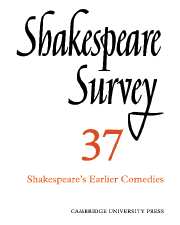Book contents
- Frontmatter
- Criticism of the Comedies up to The Merchant of Venice: 1953–82
- Plotting the Early Comedies: The Comedy of Errors, Love’s Labour’s Lost, The Two Gentlemen of Verona
- The Good Marriage of Katherine and Petruchio
- Shrewd and Kindly Farce
- Illustrations to A Midsummer Night’s Dream before 1920
- The Nature of Portia’s Victory: Turning to Men in The Merchant of Venice
- Nature’s Originals: Value in Shakespearian Pastoral
- 'Contrarieties agree': An Aspect of Dramatic Technique in Henry VI
- Falstaff’s Broken Voice
- ‘He who the sword of heaven will bear’: The Duke versus Angelo in Measure for Measure
- War and Sex in All’s Well That Ends Well
- Changing Places in Othello
- Prospero’s Lime Tree and the Pursuit of Vanitas
- Shakespearian Character Study to 1800
- How German is Shakespeare in Germany? Recent Trends in Criticism and Performance in West Germany
- Shakespeare Performances in Stratford upon–Avon–and London, 1982–3
- The Year's Contributions to Shakespearian Study 1 Critical Studies
- 2 Shakespeare’s Life, Times and Stage
- 3 Editions and Textual Studies
- Index
Plotting the Early Comedies: The Comedy of Errors, Love’s Labour’s Lost, The Two Gentlemen of Verona
Published online by Cambridge University Press: 28 March 2007
- Frontmatter
- Criticism of the Comedies up to The Merchant of Venice: 1953–82
- Plotting the Early Comedies: The Comedy of Errors, Love’s Labour’s Lost, The Two Gentlemen of Verona
- The Good Marriage of Katherine and Petruchio
- Shrewd and Kindly Farce
- Illustrations to A Midsummer Night’s Dream before 1920
- The Nature of Portia’s Victory: Turning to Men in The Merchant of Venice
- Nature’s Originals: Value in Shakespearian Pastoral
- 'Contrarieties agree': An Aspect of Dramatic Technique in Henry VI
- Falstaff’s Broken Voice
- ‘He who the sword of heaven will bear’: The Duke versus Angelo in Measure for Measure
- War and Sex in All’s Well That Ends Well
- Changing Places in Othello
- Prospero’s Lime Tree and the Pursuit of Vanitas
- Shakespearian Character Study to 1800
- How German is Shakespeare in Germany? Recent Trends in Criticism and Performance in West Germany
- Shakespeare Performances in Stratford upon–Avon–and London, 1982–3
- The Year's Contributions to Shakespearian Study 1 Critical Studies
- 2 Shakespeare’s Life, Times and Stage
- 3 Editions and Textual Studies
- Index
Summary
Dealing with plot in terms derived and adapted from Aristotle and the Terentian theorists, and applying it to the protasis of Shakespeare’s early comedies, requires some explanatory, if not apologetic, introductory remarks. For plot, a few recent critical efforts notwithstanding, is not an accepted critical tool. We may no longer be guilty of the downright denunciation formulated by an anonymous mid-Victorian critic who levelled the charge of puerility against plot: ‘Few men’, he stated apodictically, ‘feel interested in a plot after nineteen.’ What we are guilty of is something possibly even more deadly – neglect. Plot, for Aristotle the soul of drama, has virtually disappeared from critical vocabulary, as is evidenced in P. G. Phialas’s statement: ‘Of the components of drama, structure, theme, and character are the most important.’ The relegation of plot to the status of ‘the most primitive of guides to our experience of a play’ by another recent critic of Shakespeare’s comedies illuminates the esteem plot-analysis currently enjoys. The reason for this neglect, if not contempt, of plot and the art of plotting by twentieth-century novelists, dramatists, and critics alike can be traced to definitions such as R. G. Moulton’s. For him plot is 'the purely intellectual side of action', any play's ultimate 'reduction to order'. From reduction, it is but a short step to reductiveness, to regarding plot as an intellectual contrivance, a blueprint for mechanical construction. (And from reductiveness, it is but a short step to Virginia Woolf's typically modern aversion to all those ' neat designs of life that are drawn up on half sheets of note paper'.)
- Type
- Chapter
- Information
- Shakespeare Survey , pp. 13 - 22Publisher: Cambridge University PressPrint publication year: 1984



